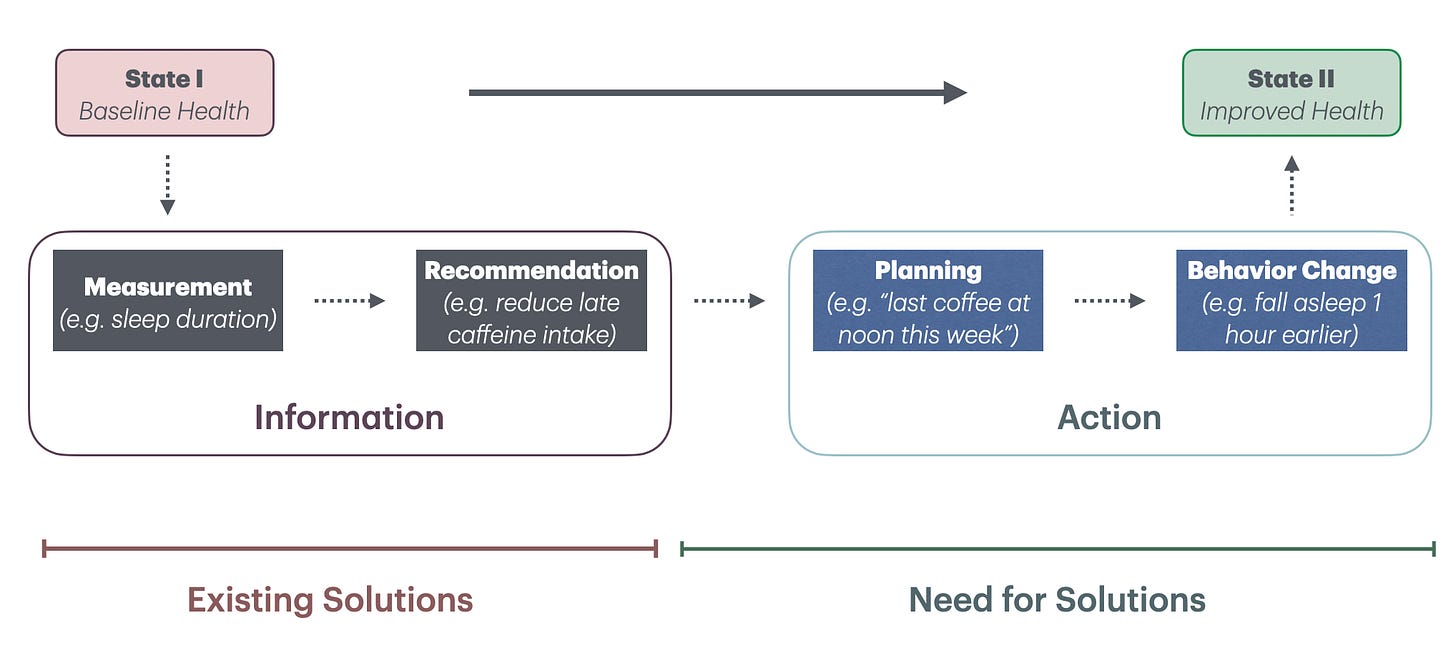The Information to Action Gap: Turning Knowledge into Health
Why hasn't access to information made us all that healthier?
What is evidence based medicine? Its driving thesis is to find ways to turn a deeper understanding of human biology and physiology into tangible improvements in health. While this ambition is widely shared, it’s easy to overlook the mechanism through which health is improved by this deeper understanding.
At its core, the process of health improvement follows a simple pattern:
Assessment: Measure the current health state (via a device, physician consultation, or other tools) to identify the root cause of non-optimal health.
Recommendation: Suggest a way to manipulate this feature (behavior change, medication, or other interventions) to achieve improvement.
Implementation: The individual attempts to act on the recommendation (e.g., picks up a prescription, changes their routine).
Sustained Change: The behavior becomes a habit, leading to better health outcomes.
You gain information about yourself and act on it to improve your health. Yet this seemingly straightforward cycle rarely delivers the promised results.
The Growing Disparity Between Information and Action
In today’s world, diagnostics, wearable devices, and AI tools have made measuring health status remarkably accessible. From tracking heart rate variability (HRV) to genome sequencing, we are inundated with health data. AI systems are increasingly adept at interpreting these metrics and generating recommendations based on large databases, clinical literature, and established algorithms. Information is no longer the limiting factor in understanding your health status.
But here’s the catch: despite these advancements, we’re not healthier.
Knowing your HRV doesn’t automatically improve your cardiovascular health. Receiving a psychiatric diagnosis might provide some relief for some and clarity for others, but it doesn’t inherently lead to better mental well-being. The critical link—the action step—is broken for many.
This disconnect is the Information to Action Gap, and it represents one of the greatest challenges in modern health innovation. Bridging this gap requires new models and solutions, ones that go far beyond traditional healthcare approaches. These solutions will almost certainly emerge from startups willing to rethink the fundamentals.
The Need for Seamless Information-to-Behavior Change
Our current healthcare system excels at collecting data but falls short in translating that data into meaningful, sustained behavior change. A few examples illustrate this gap:
Annual Physicals: While one third of Americans report attending an annual checkup, research shows these visits have little to no impact on overall morbidity or mortality. They consume time and resources without delivering tangible health benefits.
AI Nudging: A recent study found that AI-driven nudges can increase physical activity by 5–10%, but these gains are incremental. While better than nothing, the approach lacks the transformative impact needed to address systemic health challenges.
Medication Adherence: Only 50% of patients adhere to prescribed treatments, a statistic that renders even the most innovative drugs ineffective for half of their intended users.
These examples highlight a critical point: knowing isn’t doing.
Potential Solutions to Bridge the Gap
To address the Information to Action Gap, we need solutions that seamlessly connect insight to action. Here are a few concepts that hold promise:
Personalized Nutrition-as-a-Service: A system that tracks dietary intake, generates a personalized grocery cart for delivery services, and recommends affordable, healthier alternatives to meet specific health goals.
Autonomous Therapeutic Delivery: Minimally invasive neuromodulation or drug delivery systems that can be programmed remotely, ensuring timely, precise treatment without relying on patient adherence.
Community-Driven Activity Platforms: Tools that integrate wearable activity data with local, personalized recommendations for community-based exercise or activities that fit an individual’s schedule and preferences.
Proactive Health Algorithms: AI systems that don’t just nudge but actively co-create health improvement strategies with users, providing real-time feedback, reminders, and dynamic adjustment to plans as life circumstances change.
Hey, maybe my ideas suck but I’m hoping you all will tell me about the better ones on which you are working.
Putting Theory to Practice
The gap between information and action is not just a challenge; it’s an opportunity. By rethinking how we translate insights into behaviors, we can revolutionize health improvement. The solutions will require creativity, empathy, and a willingness to challenge traditional models of healthcare delivery.
What solutions are you working on to bridge this gap?



I am increasingly becoming convinced that there's no one sized fits all "action plan". I suspect this is why some diets work for some people, don't work for others. Wouldn't it be cool to know exactly what our genome is conditioned to respond to? Maybe I need 2x the amount of leafy greens than my peer to maintain a baseline. Maybe some else needs half the exercise.
I suspect once we have the perfect data model it will match our intuition and heuristics today. It will also shed light on what sometimes is a frustrating wellness journey.